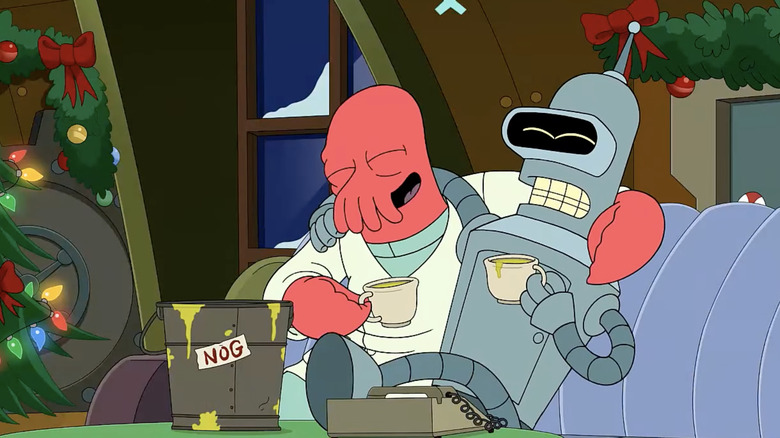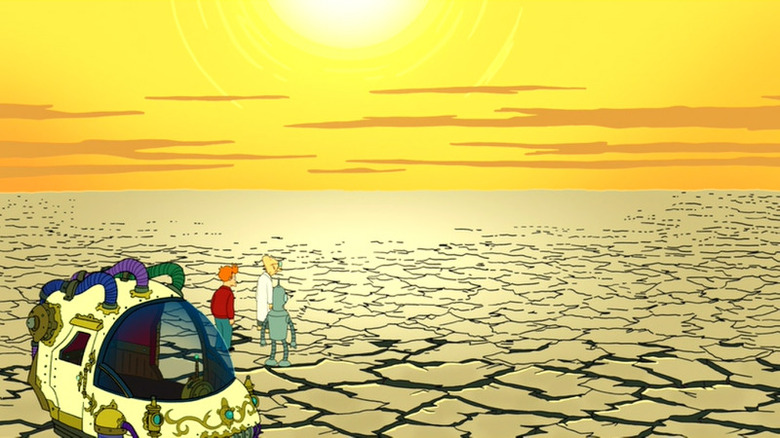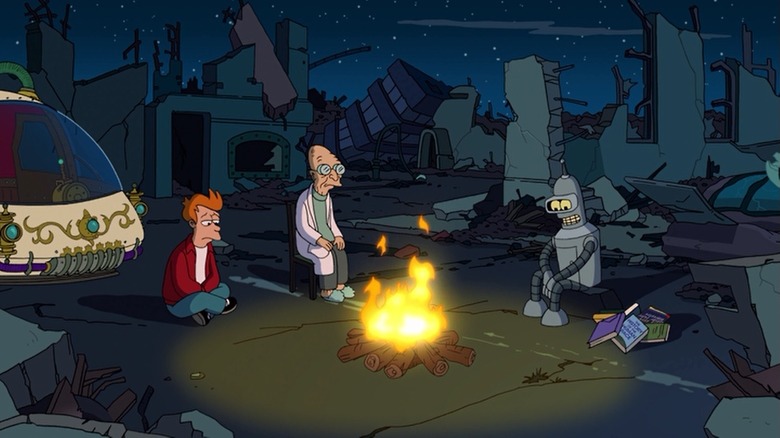Futurama Season 11 Pays Homage To One Of The Best Episodes Of The Comedy Central Run
Spoilers for "Futurama" season 11 follow.
The latest "Futurama" episode, "I Know What You Did Next Xmas," joins the canon of previous holiday episodes — "Xmas Story," "A Tale of Two Santas," and "The Futurama Holiday Spectacular." Indeed, it is Xmas season (as the December holiday is exclusively known in the 31st century), and as usual for Planet Express, this Yuletide isn't about good tidings and cheer. They have to dodge the wrath of Robot Santa (John DiMaggio), who kills those he deems naughty. Namely, everyone except Dr. Zoidberg (sometimes).
However, "I Know What You Did Next Xmas" is also this revival season's first episode about time travel. "Futurama" uses this concept only sparingly; it took 50 episodes before they first did so in "Roswell That Ends Well." To get to the future, 20th-century everyman Fry (Billy West) had to take the long (cryogenic) path. It's not surprising then that "I Know What You Did Next Xmas" builds on a previous time travel episode: "The Late Philip J. Fry."
That episode, written by Lewis Morton, was part of Comedy Central's 2007-2013 revival of "Futurama." That five seasons worth of episodes isn't often held to the same par as the original 1999 to 2003 run. However, Morton was part of the show's writing staff during that run, and "The Late Philip J. Fry" is the highlight of season 7, neck-and-neck with the quality of classic episodes.
The Late Philip J. Fry
"The Late Philip J. Fry" has a double meaning. Due to Bender's noisiness, Fry sleeps in, arriving late to both work and his lunch date with Leela. He promises to make it up to Leela with a dinner date, but due to his tardiness, he's stuck testing Professor Farnsworth's latest invention with Bender. Said invention is a time machine, but one that only goes forward in time so its users can't muck up the past. The Professor's clumsiness sends the trio to the year 10,000 AD. With no way of going back, they're declared dead in the present.
The trio decides to keep going further into the future to find someone who has invented a backwards time machine. These attempts only bring them to the desolate year 1 Billion, so they decide to sit back and watch the universe die. Then it hits them — "it" being a second Big Bang.
In "Futurama," time is cyclical; after every Big Crunch, the universe restarts and proceeds exactly like the previous one did. They end up having to go around twice due to Farnsworth missing the mark, again, but they eventually return to 3010 and crush their duplicates (what "Rick and Morty" did, "Futurama" did first"). Fry makes his date with Leela and promises from now on, he'll never be late again because "[the old Fry] is dead now." The end.
Why is the episode beloved? It's the most innovative episode of its season, not relying on either current events or previous episodes. It also has the right mix of humor and heart that makes "Futurama" special. Take the montage of the time-traveling trio arriving in increasingly absurd futures, set to the musical Zager and Evans parody "In The Year 252525." This hilarity is in the same episode as Leela discovering the truth about Fry's disappearance and leaving a love message for him carved in stalagmites.
Learning from the past
In "I Know What You Did Next Xmas," the Professor's time machine returns. It bears the old design, but Farnsworth has learned his lesson and modified it to travel backward in time as well. His plan is to go to 2801 (the year of Santa's creation) and stop him from becoming evil by flipping the naughty/nice sensor built into his back.
The Professor seemingly succeeds, but echoing "The Late Philip J. Fry," he winds up overextending the time machine's gear and sends it hurtling back through time, not forward. So, he takes the "scenic route" through the universal reset — the imagery of the Professor watching history unfold in fast forward is taken from "The Late Philip J. Fry," as are some of the futures Farnsworth glimpses on his journey.
When he gets back to the present, Santa is still evil. The Professor realizes his mistake; the robot's naughty/nice sensor was originally set correctly and by flipping it, he made Santa evil. This revelation is consistent with the show's approach to time travel; in "Futurama," you can't change history because time is a closed loop. "Roswell That Ends Well" famously tackled the physics conundrum known as the Grandfather Paradox (if a time traveler kills their own ancestor in the past, how did they exist in the first place to do so?). Fry solves it by unknowingly seducing his grandmother Mildred and becoming his own grandfather.
In "Futurama," trying to change the future — with time travel or otherwise — will never work out.
New episodes of "Futurama" are released on Mondays on Hulu.


